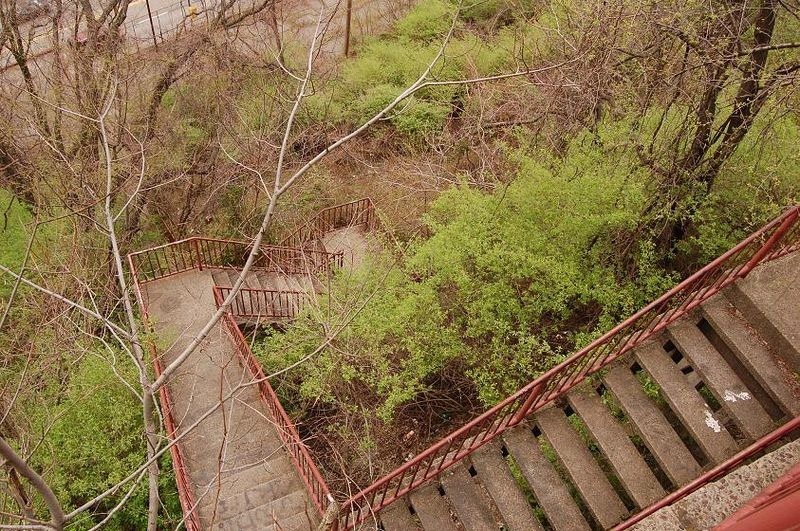The city of Pittsburgh in Pennsylvania, the United States, is located over an unruly terrain of hills, hollows, valleys and three intersecting rivers. Back in the late 19th and early 20th century, when Pittsburgh was growing as a coal and steel town, factory workers built houses in the hills rising above the flat riverbanks that were lined with factories. In order to commute to work, city officials and residents built staircases along the mountainside, originally of wood and later with concrete that ran up and down and all over creating a chaotic place that is notoriously difficult to navigate.
Revered American journalist Ernie Pyle famously wrote about the city in 1937:
Pittsburgh is undoubtedly the cockeyedest city in the United States. Physically, it is absolutely irrational. It must have been laid out by a mountain goat... I've flown over it, and driven all around it, and studied maps of it, and I hardly know one end of Pittsburgh from the other... There's just one balm -- people who live here can't find their way around, either.
Steps on Fannel Street.
Many of the city's neighborhoods are steeply sloped with two-lane roads. “Some streets are narrow, some wide. None runs more than a few blocks in a straight line,” wrote Ernie Pyle.
It's up and down, and around and around, and in betwixt… You may have a friend who lives half a mile away. But to get there you circle three miles around a mountain ridge, cross two bridges, go through a tunnel, follow a valley, skirt the edge of a cliff, and wind up at your friend's back door an hour after dark.
Certain sections of the city are so steep and narrow that these neighborhoods are serviced by special fire trucks that are small and have tighter turning radius, when they get called in case of emergency. Many of the streets that appear on maps are, in fact, not streets at all but long staircases that often surprise unsuspecting visitors. Just like real streets, they have names, signs and even house numbers.
Ray DeMichiei, Pittsburgh's deputy director of emergency management, said he often had to find detours when he worked on a city ambulance in 1975. “There were numerous times when I was navigating and the driver's driving that we screeched at a set of city steps,” he said.
According to retired geophysicist Bob Regan, who has spent years cataloguing every stairway in Pittsburgh, there are a total of 712 public stairways and 44,645 steps in the city, accounting for 24,108 feet of vertical height and 23 miles in distance.
Most of the stairways were built in the 1940s and 1950s, and not all of them are in a pretty state. The city allocates just $200,000 each year for step maintenance but repairing just one set of steps can cost $100,000.
Ray Avenue steps.

Weeds overgrowing the steps of Ray Avenue
Peola Road steps to Texdale Street
Steps of Hackett Way
Here Camelia Street ends and the steps of 54th Street starts.
North Winebiddle Street steps

Goettmann Street steps
Bismark Street
Looking down Ella Street
Duquesne University steps.
Sources: About.com / Wall Street Journal / The Firecracker / TribLive / The Pittsburgh Press (Apr 19, 1945)
Photo courtesy: www.frontiernet.net/~rochballparks2/towns/pgh_steps.htm





















Cincinnati has many steps like this too. They fall into disrepair as blacks take over the neighborhoods
ReplyDeleteThat's racist dude!
DeleteUnfortunately, it's most likely also true.
DeleteI grew up in Hazelwood-e.elizabeth st-steep street-but good for strong legs
ReplyDeleteclimbing up every day-did not realize there are so many steps-should be more
dollars added to rebuild these steps.Relatives still live there-hope redevelopment does take place along second ave as Hazelwood is a prime location-miss it!!
location-mis it!!
Ideal running stairs. There are also nice stairs in Poland :D:D:D
ReplyDelete